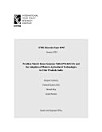Country profile – Kenya: Gender, climate change, and nutrition linkages
About this ebook
A majority of Kenyan farmers operate on a small scale and are solely dependent on rainfall (D’Alessandro et al., 2015). However, since the 1970s, the country has experienced significant changes in rainfall pat terns--average rainfall during the long season has decreased while rainfall during other times of the year has increased and the country has experienced more frequent climate extreme events (Kogo et al. 2021). Increased climate variability has negative effects on agriculture and may exacerbate inequalities within the sector. Due to gender inequalities and gender-differentiated roles in agrifood systems, men and women do not experience climate change and variability in the same ways (Balikoowa et al., 2019; Lecoutere et al. 2023). According to the World Economic Forum, women are more vulnerable than men to climate change due to lower education and exclusion from the political and domestic decision-making processes that affect their lives (Gunawardena, 2020).






